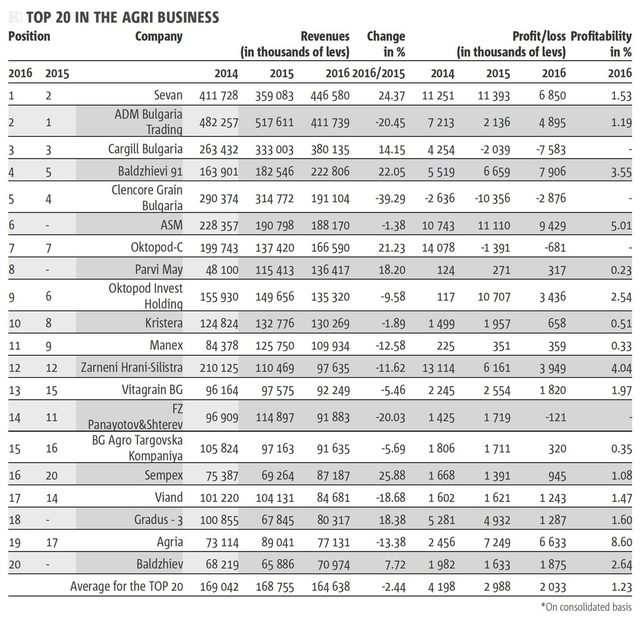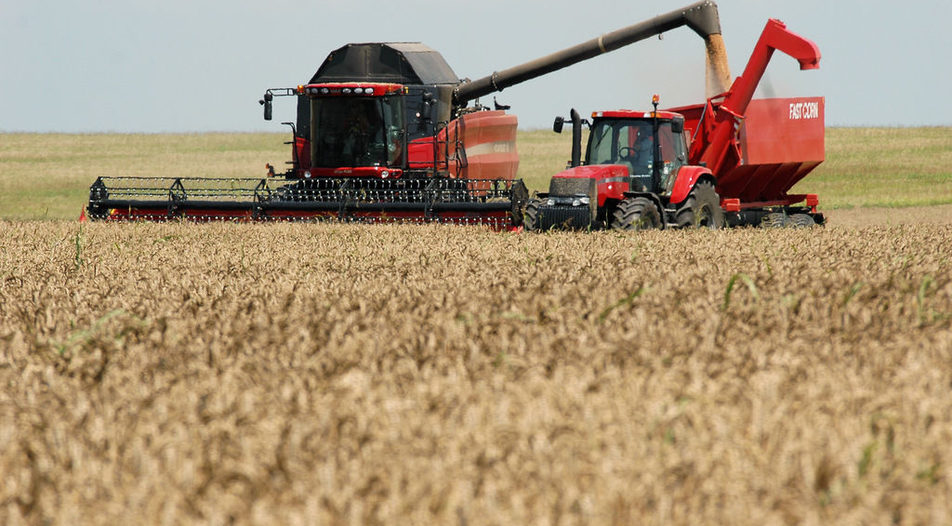If there was a general trend on the world grain markets in recent years, it was the decline in prices. High yields in key producing countries as a result of good climatic conditions, investments in productivity increase and extension of the areas under cereals resulted in a decrease of prices and accumulation of stock. Bulgaria is no exception to the general picture. In 2016, the country reported a record-high production of 5.6 million tonnes of wheat, which is the highest amount harvested since 1980. However, according to different assessments, the purchase prices dropped 10 to 15 percent.
Again, the trend of selling higher volumes at lower prices is easily visible in the current ranking of the biggest companies in agriculture that is traditionally dominated by the grain traders. The revenues of the 20 top companies in the sector totalled 3.3 billion levs in 2016, while their average decline was 2.4%. The lower results were not due to a poorer individual performance of the separate companies. The local subsidiary of Swiss-based Clencore, Clencore Grain Bulgaria, registered the biggest drop of revenues during the year under review (39%). The price decline also caused shrinkage in the stock breeding sector.
If there is good news from the sector, it is that 16 of the biggest 20 companies have posted profits, albeit at narrower margins.
According to current predictions, 2017 will be yet another tense year as it will be difficult to achieve growth of prices when the grain harvest is expected to be good. Even now the stock on the world market is growing with production exceeding consumption, while there is practically no trade, according to industry estimates.
Top 5
Bourgas-based grain trader, Sevan, has restored its leading position. During the year under review the company had revenues of 446.6 million levs, up from 359 million levs in 2015. Its profit, however, dropped to 6.85 million levs from 11.39 million levs. Sevan's manager and owner, Artur Akopyan, comments that it has become more difficult to trade and the competition in the Black Sea basin is enormous.
"The amounts traded and the revenues have increased because we have set a foothold on new markets," Akopyan also said, adding that last year the company struck deals in countries such as India, Indonesia, Vietnam, and others.
Unlike Sevan, the other company from Akopyan's group, Hraneksport BG, saw its business shrink with revenues falling to 65 million levs last year from 107 million levs in 2015 and, therefore, it does not feature in the ranking.
In 2016, the leader of the previous year, ADM Bulgaria Trading, a subsidiary of US-based ADM (Archer Daniels Midland Company), was second. The company also suffered from the lower grain prices, with its revenues down 20% to 412 million levs in 2016 compared to over 500 million levs a year earlier. Unlike Sevan, however, ADM Bulgaria Trading managed to increase its profit to 4.9 million levs in 2016 compared to 2.1 million levs during the previous year, which was however rather a return to the normal margins. A fresh development related to the company is the opening of its new port on the Danube river, in the area of Silistra, scheduled for the summer.
Cargill Bulgaria, a branch of another US-based grain trader, Cargill, is third in the ranking. The company reported revenues of over 380 million levs last year, compared to 333 million levs in 2015. However, 2016 was the second straight year of loss for Cargill Bulgaria and what's more, the loss widened.
There are several more grain traders among the biggest companies in the ranking. These are Clencore Grain Bulgaria and Vitagrain BG, a company majority owned by Greece's Soya Mills, with Martin Roussev and Dutch national Barry Boeters holding minority stakes.
The leader in grain production, Oktopod Invest Holding, is among the biggest companies in the ranking with revenues of 135.3 million levs, which mark a drop compared with 2015. Oktopod Invest Holding and the other companies related to its owner, Svetlozar Dichevski, cultivate over 1 million decares of agricultural land in the country, according to industry representatives. Therefore, the company has been a leading beneficiary of EU subsidies - area-based direct payments for farmers - for years.
Outside the grain sector
Besides companies involved in grain production and trade, firms of other subsectors also rank among the biggest ones in agriculture. One example is Manex, which operates in cattle breeding. The Varna-registered company is owned by Nasko, Dida and Dragostina Manasiev, with the group comprising several related companies: ET Manex - Nasko Manasiev, Manex Star and Manex Sun. The group owns one of the biggest pig breeding facilities in the country, equipped with a fodder workshop with a capacity of 18,000 tonnes per year and a warehouse for the storage of up to 40,000 tonnes of fodder crops. In 2016, Manex posted revenues of 109.9 million levs, down 12.6% on an annual basis. Yet, the company slightly increased its profit to 359,000 levs.
"The reduction of revenues is due to the very low price of pork in the first six months of the year," Manex manager Simeon Manasiev commented. He said that the company expects revenue growth of 15% in 2017, partly due to a change in management to include US consultants.
Another company of the top 20 in agriculture - Viand - is also working in partnership with the stock breeding sector. The company owns five fodder plants in Bulgaria. In 2016, it also reported a drop in revenues - to 84.68 million levs from 104.1 million levs a year earlier. "If you consider our revenues in absolute terms, you should take note of the fact that in their essence they reflect the grain price. There is a reversal of the structure of our business and now 51% of the revenues come from our own production of inputs, while 49% come from trade in grain and fodder," Viand's manager Kornelia Haritonova said.
The fall in revenue in 2016 was due to a combination of several unfavourable factors. On the one hand, according to Haritonova, there has been a trend towards reduction of fodder production in recent years, which is partly due to the EU measures for animal welfare having resulted in an overall drop of the number of animals in Bulgaria. At the same time, harsh winter weather conditions have hampered shipments to Romania, the other main market of the company.
What to expect in 2017?
Although it is very difficult to make predictions in the agricultural sector due to its dependence on weather conditions, there are several factors, which are expected to drive the market. On the one hand, global grain prices are likely to remain low and trade will be tough. In the stock breeding sector, the prices are getting steady and the trade in animal products is expected to increase, mostly on the domestic market. According to representatives of the sector, increased consumption and the expected strong tourist season at the seaside have been increasing the orders to the producers of meat, milk, eggs and other products and, therefore, 2017 is expected to be better than the previous year.

If there was a general trend on the world grain markets in recent years, it was the decline in prices. High yields in key producing countries as a result of good climatic conditions, investments in productivity increase and extension of the areas under cereals resulted in a decrease of prices and accumulation of stock. Bulgaria is no exception to the general picture. In 2016, the country reported a record-high production of 5.6 million tonnes of wheat, which is the highest amount harvested since 1980. However, according to different assessments, the purchase prices dropped 10 to 15 percent.
Again, the trend of selling higher volumes at lower prices is easily visible in the current ranking of the biggest companies in agriculture that is traditionally dominated by the grain traders. The revenues of the 20 top companies in the sector totalled 3.3 billion levs in 2016, while their average decline was 2.4%. The lower results were not due to a poorer individual performance of the separate companies. The local subsidiary of Swiss-based Clencore, Clencore Grain Bulgaria, registered the biggest drop of revenues during the year under review (39%). The price decline also caused shrinkage in the stock breeding sector.












